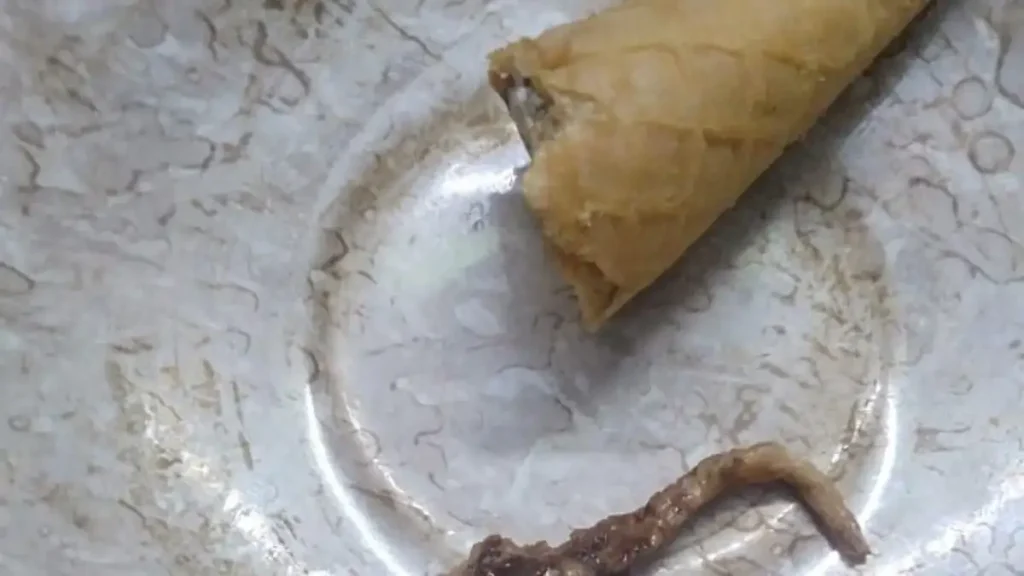Gujarat Woman Discovers Lizard Tail in Ice Cream Cone, Authorities Seal Shop and Impose ₹50,000 Fine
In a shocking and disturbing incident, a woman in Gujarat discovered what appeared to be a lizard’s tail in her ice cream cone. She had already eaten nearly half of the treat before noticing the strange object, which left her disgusted and concerned for her health. The story quickly spread online, triggering public outrage and prompting authorities to act fast.

A Treat Turns Into a Nightmare
The woman, whose identity remains private, had purchased the ice cream cone from a local shop in Gujarat. As she enjoyed it, she suddenly noticed something unusual in the texture. Upon closer inspection, she realized a part of a lizard’s tail was lodged in the ice cream.
She immediately informed others nearby and contacted local authorities. Photos and videos of the contaminated cone began circulating on social media, sparking widespread condemnation and calls for accountability.
Authorities Seal the Shop and Impose Fine
Soon after receiving the complaint, food safety officers visited the shop. They inspected the premises and confirmed the issue. As a result, officials sealed the shop to prevent further health risks and imposed a ₹50,000 fine on the owner for violating food safety regulations.
The team also collected a sample of the ice cream and sent it to a lab for testing. Early inspection suggested the foreign object was indeed part of a lizard’s tail.
Health Concerns and Emotional Stress
While the woman has not reported any illness so far, health experts warned of potential risks. Consuming contaminated food, especially with parts of animals like lizards, can lead to infections, allergic reactions, or food poisoning.
The emotional toll on the woman has also been significant. She expressed deep distress over the incident. “I can’t even think about eating anything cold or sweet anymore,” she shared during a brief chat with local reporters.
Public Outrage on Social Media
As soon as the story surfaced online, social media users expressed anger and disbelief. Many demanded stricter food inspections and tougher punishment for negligence. Some even shared similar experiences, adding to growing concerns about hygiene in local food businesses.
Hashtags like #FoodSafety, #LizardInIceCream, and #GujaratIncident trended for hours. Users tagged government bodies and food safety authorities, urging immediate improvements.
Food Safety Concerns in India
This incident has reignited serious questions about food safety practices in India. Although the Food Safety and Standards Authority of India (FSSAI) provides clear guidelines, many local food outlets do not follow them consistently.
Experts believe that the lack of regular inspections and poor training among staff often leads to such mishaps. In some cases, business owners either ignore or remain unaware of basic hygiene protocols.
Shop Owner Faces Legal Trouble
Selling unsafe or contaminated food is a punishable offense under India’s Food Safety and Standards Act, 2006. In this case, the ₹50,000 fine marks just the beginning of possible legal consequences.
Officials mentioned that more serious action could follow after lab results confirm the contamination. If confirmed, the shop owner might face prosecution under Section 59 of the FSS Act, which allows up to six months in jail and a fine that could reach ₹1 lakh.
A Call for Stronger Food Safety Enforcement
Consumer rights groups called the incident a wake-up call for the food industry. One spokesperson emphasized the need for consistent enforcement and better public awareness. “Every vendor must follow hygiene standards—food safety is not optional,” they said.
These groups have also urged local governments to increase the frequency of inspections and ensure all food businesses display cleanliness certificates in plain sight.
How Consumers Can Stay Safe
While vendors must take responsibility for hygiene, consumers can also protect themselves by staying alert:
- Choose outlets that follow visible hygiene practices.
- Look for valid licenses or certificates.
- Report suspicious food immediately to authorities.
- Share verified incidents to raise public awareness.
A Shocking Reminder
This disturbing incident from Gujarat highlights how a simple indulgence can turn dangerous due to carelessness. It also serves as a reminder of the need for better safety practices, especially among smaller food vendors who often slip through regulatory cracks.
With proper enforcement and informed consumers, such incidents can become rare. The swift action by authorities in this case offers hope that those responsible will face real consequences—and that others in the industry will start taking food safety more seriously.






